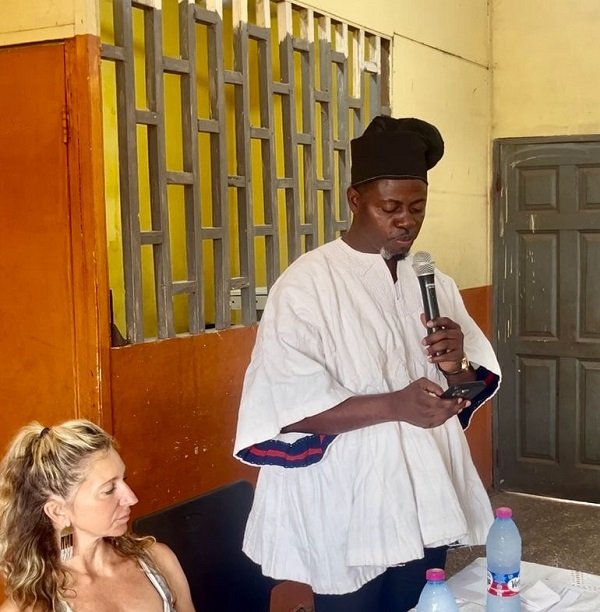News
Give legal backing to sign language – GNAD President
The Ghana National Association of the Deaf (GNAD) has called on the Government to give legal recognition of the Ghanaian Sign Language (GSL) as a native language of the Deaf and hard of hearing people in Ghana.
The association said communication with to the deaf community faced some challenges and believed that legal backing for GSL as done in countries like Uganda, South Africa, USA, and Denmark would help remove the barrier which impeded access to education, health, employment and other social economic activities of the deaf.
The President of GNAD Mr. Matthew Kubachua said this during the commemoration of the International Day of Sign Languages held in Accra last week.
The day which was marked in partnership with the National Association of Sign Language Interpreters- Ghana (NASLIG) was on the theme ‘Recognition of Ghanaian Sign-Language, we Sign for Human Rights’. It was to also raise awareness of the importance of sign languages and strengthen their statuses.
According to Mr. Kubachua, these barriers existed because of the lack of legal recognition of the Ghanaian Sign Language as the native language of the deaf in Ghana.
“Government’s effort at disability inclusion can only be achieved when the state recognises Ghanaian Sign Language as one of the native languages and prioritises the use of it in the provision of services,” he said.
He indicated that the legal recognition of Ghanaian Sign Language and the subsequent formulation of modalities in its use for the provision of services for the deaf and Hard of Hearing would improve the socio-economic conditions and quality of life of the deaf.
“On the occasion of International Day of Sign Languages, GNAD wishes to draw the attention of the government to the fact that the revised Persons with Disability Act, Act 715.
“The implementation of the Act holds key to disability inclusion in Ghana and any delay in its passage will deny persons with disabilities their right to enjoy the rights to divinity as citizens of Ghana,” Mr. Kabachua stressed.
He called on the Ministry of Education and the Ghana Education Service to expand access to quality basic and secondary education to as many deaf children as possible through the expansion of existing schools for the deaf, allocation of one of the newly constructed Senior High Schools and the engagement of qualified sign language interpreters in some senior high schools to improve access to inclusive education.
A lecturer at the Department of Special Education, University of Education, Winneba, Dr Daniel Fobi also said that due to the lack of early ear screening of children, those born deaf were not detected early until they reached about four or five years.
This, he said, was detrimental to the growth of the child and affected their performance compared with their hearing counterparts.
Dr Fobi urged parents to ensure their children were screened early to give deaf children early access to the learning of the sign language.
By Jemima Esinam Kuatsinu
News
Support Street Academy to Break Cycle of Poverty in Society — Odododiodioo MP

Mr. Alfred Nii Kotey Ashie, the Member of Parliament for the Odododiodioo Constituency in the Greater Accra Region, has assured the Accra Street Academy of his support in achieving its mission of uplifting vulnerable children within the community to break the cycle of poverty. “Without the needed support, your efforts may go round in circles due to the enormity of the task. This should not be left on the shoulders of the Academy alone. You need support from both government and the private sector. With that, the Academy would be in a good position to shape the future of these children on the streets,” he said.
The Accra Street Academy, originally formed in 1985 as a boxing arena, now serves as a school for deprived children, with most of its population numbering hundreds of pupils being neglected children from the streets of Jamestown and its environs. Mr. Alfred Nii Kotey Ashie made these remarks at the annual stakeholders’ meeting and fundraising event held over the weekend under the theme “Empowering Street Children: Health and Wellness.” The event is one of the Academy’s annual programmes, organized to raise funds and other forms of support to aid the school in catering to the needs of the children and holding its Christmas get-together.
According to the MP, it is worth noting that these children are taught and provided with two meals and a snack daily through the support of benevolent members of society. In view of this, he promised to facilitate the acquisition of documents needed for the construction of an Astroturf within the school’s premises. He noted that “every child has the right to play, and therefore I pledged to do my best to secure the needed documents” for the project to commence.
The legislator disclosed that over the years, the academic programmes of the Accra Street Academy have transformed children surviving on the streets into successful adults. He therefore urged other members of society to partner with the school to “help pupils rise higher for a better Ghana.” In the 2025/26 academic year, 22 pupils were absorbed by the Accra Metro Education Directorate as they transitioned into various Junior High Schools, while still returning to the Accra Street Academy for academic support.
Ms. Yvonne Abba-Opoku, a chartered governance advisor and senior executive in the nonprofit and charity sector, stated that the best gift to give a child was education.
By Spectator Reporter
Join our WhatsApp Channel now!
https://whatsapp.com/channel/0029VbBElzjInlqHhl1aTU27
News
Attend antenatal clinics for safe delivery … expectant mothers urged

Mrs Regina Kudom, Senior Midwifery Officer at the New Atuabo Health Centre in the Tarkwa Nsuaem Municipality, has urged expectant mothers to attend antenatal clinic regularly for safe delivery.
She revealed that “in Tarkwa and its environs many pregnant women prefer staying at prayer camps, we are not against that, you can be there, but when your time is up for your antenatal session make sure you attend.”
Mrs Kudom gave the advice when the Gold Fields Ghana Foundation (GFGF) observed the World Prematurity Day with pregnant women at New Atuabo, Huniso and Awudua health centres.
World Prematurity Day falls on November 17, every year, and it is celebrated to raise awareness about the challenges faced by pre-term babies and their families.
She said research suggested that sex during pregnancy could soften the cervix and potentially aid in labour preparation.
“That is the reason why we encourage pregnant women to have sex with their partners, if they do not have any health implications,” she added.
Mrs Kudom appealed to the GFGF to upgrade the New Atuabo health centre as the current structure was too small because they received many patients daily.
Madam Ayishetu Mohammed, Project Coordinator for GFGF, explained that they received donations from Project C. U. R. E and the items were given to health facilities in their operational area.
She stated that they noticed there were baby dresses, sanitary pads, and baby apparel, so they decided to distribute them among expectant mothers in three of their host communities.
Madam Mohammed said because the foundation was interested in preventive care, they brought a midwife from the Tarkwa Mine hospital to educate the pregnant women.
She extolled the midwives in New Atuabo health centre for the education they gave to the pregnant women and implored them to heed to the advice given during antenatal visits to reduce maternal deaths in the Tarkwa Nsuaem and Prestea Huni-Valley Municipalities.
Mr Paa Kwasi Egan, Deputy Chief Physician Assistance, emphasised that a pregnant woman being anemic meant she was not eating a balance diet, and added that, “Some of these women do not have money to buy food or visit antenatal clinics.”
He said when men follow their wives for antenatal visits, they would be educated extensively on why they should provide funds for their pregnant wives.
Mr Egan, therefore, encouraged all men to be involved in their pregnant wives’ antenatal care appointments so they could learn more about pregnancy, childbirth, and parenting. – GNA







